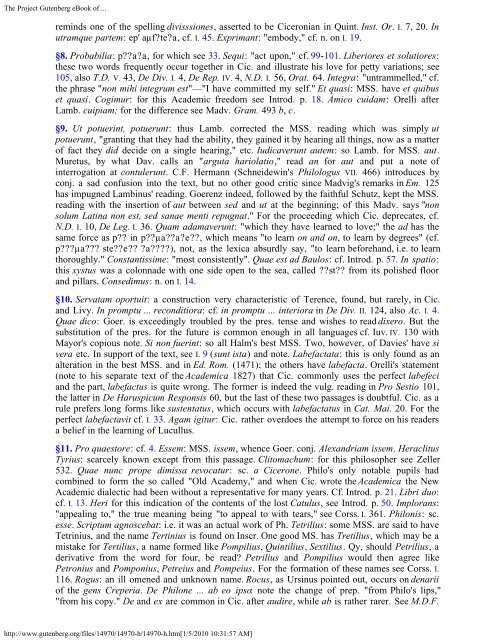academica of cicero. - 912 Freedom Library
academica of cicero. - 912 Freedom Library
academica of cicero. - 912 Freedom Library
You also want an ePaper? Increase the reach of your titles
YUMPU automatically turns print PDFs into web optimized ePapers that Google loves.
The Project Gutenberg eBook <strong>of</strong> ...<br />
reminds one <strong>of</strong> the spelling divisssiones, asserted to be Ciceronian in Quint. Inst. Or. I. 7, 20. In<br />
utramque partem: ep' aµf?te?a, cf. I. 45. Exprimant: "embody," cf. n. on I. 19.<br />
§8. Probabilia: p??a?a, for which see 33. Sequi: "act upon," cf. 99-101. Liberiores et solutiores:<br />
these two words frequently occur together in Cic. and illustrate his love for petty variations; see<br />
105, also T.D. V. 43, De Div. I. 4, De Rep. IV. 4, N.D. I. 56, Orat. 64. Integra: "untrammelled," cf.<br />
the phrase "non mihi integrum est"—"I have committed my self." Et quasi: MSS. have et quibus<br />
et quasi. Cogimur: for this Academic freedom see Introd. p. 18. Amico cuidam: Orelli after<br />
Lamb. cuipiam; for the difference see Madv. Gram. 493 b, c.<br />
§9. Ut potuerint, potuerunt: thus Lamb. corrected the MSS. reading which was simply ut<br />
potuerunt, "granting that they had the ability, they gained it by hearing all things, now as a matter<br />
<strong>of</strong> fact they did decide on a single hearing," etc. Iudicaverunt autem: so Lamb. for MSS. aut.<br />
Muretus, by what Dav. calls an "arguta hariolatio," read an for aut and put a note <strong>of</strong><br />
interrogation at contulerunt. C.F. Hermann (Schneidewin's Philologus VII. 466) introduces by<br />
conj. a sad confusion into the text, but no other good critic since Madvig's remarks in Em. 125<br />
has impugned Lambinus' reading. Goerenz indeed, followed by the faithful Schutz, kept the MSS.<br />
reading with the insertion <strong>of</strong> aut between sed and ut at the beginning; <strong>of</strong> this Madv. says "non<br />
solum Latina non est, sed sanae menti repugnat." For the proceeding which Cic. deprecates, cf.<br />
N.D. I. 10, De Leg. I. 36. Quam adamaverunt: "which they have learned to love;" the ad has the<br />
same force as p?? in p??µa??a?e??, which means "to learn on and on, to learn by degrees" (cf.<br />
p???µa??? ste??e?? ?a????), not, as the lexica absurdly say, "to learn beforehand, i.e. to learn<br />
thoroughly." Constantissime: "most consistently". Quae est ad Baulos: cf. Introd. p. 57. In spatio:<br />
this xystus was a colonnade with one side open to the sea, called ??st?? from its polished floor<br />
and pillars. Consedimus: n. on I. 14.<br />
§10. Servatam oportuit: a construction very characteristic <strong>of</strong> Terence, found, but rarely, in Cic.<br />
and Livy. In promptu ... reconditiora: cf. in promptu ... interiora in De Div. II. 124, also Ac. I. 4.<br />
Quae dico: Goer. is exceedingly troubled by the pres. tense and wishes to read dixero. But the<br />
substitution <strong>of</strong> the pres. for the future is common enough in all languages cf. Iuv. IV. 130 with<br />
Mayor's copious note. Si non fuerint: so all Halm's best MSS. Two, however, <strong>of</strong> Davies' have si<br />
vera etc. In support <strong>of</strong> the text, see I. 9 (sunt ista) and note. Labefactata: this is only found as an<br />
alteration in the best MSS. and in Ed. Rom. (1471); the others have labefacta. Orelli's statement<br />
(note to his separate text <strong>of</strong> the Academica 1827) that Cic. commonly uses the perfect labefeci<br />
and the part, labefactus is quite wrong. The former is indeed the vulg. reading in Pro Sestio 101,<br />
the latter in De Haruspicum Responsis 60, but the last <strong>of</strong> these two passages is doubtful. Cic. as a<br />
rule prefers long forms like sustentatus, which occurs with labefactatus in Cat. Mai. 20. For the<br />
perfect labefactavit cf. I. 33. Agam igitur: Cic. rather overdoes the attempt to force on his readers<br />
a belief in the learning <strong>of</strong> Lucullus.<br />
§11. Pro quaestore: cf. 4. Essem: MSS. issem, whence Goer. conj. Alexandriam issem. Heraclitus<br />
Tyrius: scarcely known except from this passage. Clitomachum: for this philosopher see Zeller<br />
532. Quae nunc prope dimissa revocatur: sc. a Cicerone. Philo's only notable pupils had<br />
combined to form the so called "Old Academy," and when Cic. wrote the Academica the New<br />
Academic dialectic had been without a representative for many years. Cf. Introd. p. 21. Libri duo:<br />
cf. I. 13. Heri for this indication <strong>of</strong> the contents <strong>of</strong> the lost Catulus, see Introd. p. 50. Implorans:<br />
"appealing to," the true meaning being "to appeal to with tears," see Corss. I. 361. Philonis: sc.<br />
esse. Scriptum agnoscebat: i.e. it was an actual work <strong>of</strong> Ph. Tetrilius: some MSS. are said to have<br />
Tetrinius, and the name Tertinius is found on Inscr. One good MS. has Tretilius, which may be a<br />
mistake for Tertilius, a name formed like Pompilius, Quintilius, Sextilius. Qy, should Petrilius, a<br />
derivative from the word for four, be read? Petrilius and Pompilius would then agree like<br />
Petronius and Pomponius, Petreius and Pompeius. For the formation <strong>of</strong> these names see Corss. I.<br />
116. Rogus: an ill omened and unknown name. Rocus, as Ursinus pointed out, occurs on denarii<br />
<strong>of</strong> the gens Creperia. De Philone ... ab eo ipso: note the change <strong>of</strong> prep. "from Philo's lips,"<br />
"from his copy." De and ex are common in Cic. after audire, while ab is rather rarer. See M.D.F.<br />
http://www.gutenberg.org/files/14970/14970-h/14970-h.htm[1/5/2010 10:31:57 AM]















